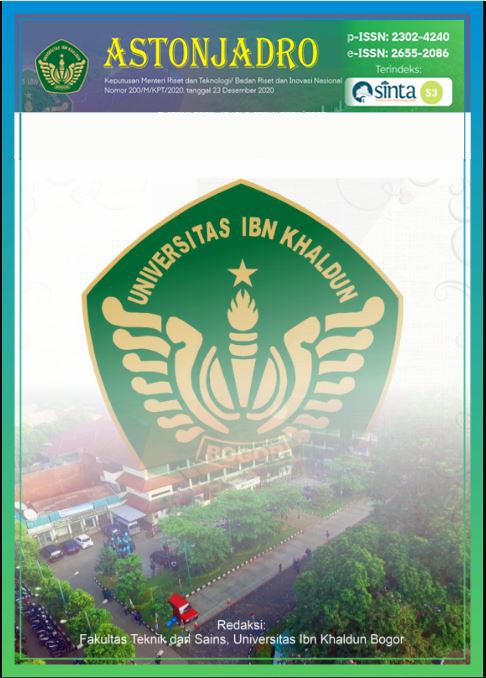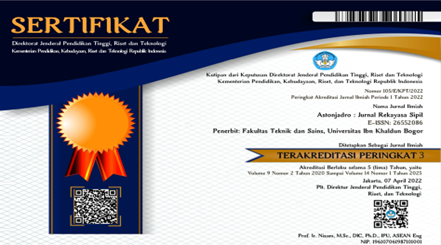Architect Aesthetic Concept in WYAH Art and Creative Space Cafe Building Ubud, Bali
DOI:
https://doi.org/10.32832/astonjadro.v12i3.14375Keywords:
architectural works; architectural aesthetic concepts; viral and instagrammable cafes.Abstract
The concept of architectural aesthetics is closely related to the architect who designed it. Architectural works of art today do not only consider the function and robustness of the structure, but also the aesthetic aspects. Current architectural developments show the trend of developing cafe buildings with unique designs that are owned as an attraction, one of which is the WYAH Art and Creative Space cafe building. This affects architects and is expected to be able to create buildings with new innovations that are unique and aesthetically attractive. This study aims to identify the aesthetic concepts applied by architects in WYAH cafe buildings. Based on the research objectives, this study uses a qualitative strategy with a phenomenology approach. The analysis technique used is content analysis and interpretive architectural criticism. The result obtained is that the aesthetic concept applied by the architect in the process of designing the WYAH cafe building adopts the surrounding nature potentials (utilizing land conditions). The implication is that this building becomes an attraction and attracts the interest of many visitors, so it can be concluded that the architect's aesthetic concept is an important value in the process of designing architectural works.
References
Abdel, H. (2022, February 15). WYAH Art & Creative Space / PARISAULI ARSITEK STUDIO. ArchDaily. Retrieved May 10, 2022, from (10 Cafe Baru Di Ubud Yang Seru Dan Memikat Hati, 2022) https://www.archdaily.com/976802/wyah-art-and-creative-space-parisauli-arsitek-studio
Abuthahir, S. B. S., & Krishnapillai, G. (2018). How does the ambience of cafe affect the revisit intention among its patrons? AS on the cafes in Ipoh, Perak. MATEC Web of Conferences, 150, 1–16. https://doi.org/10.1051/matecconf/201815005074
Agustina, I. A., & Angkawijaya, Y. (2019). Fenomena Swafoto dan Pengaruhnya Terhadap Budaya Visual pada Estetika Interior Ruang Komersial. Jurnal Desain Interior, 4(1), 37–48.
Aisha, M. (2022). 35+ cafe di Ubud view bagus, unik, instagrammable! Topijelajah.
Eaton, M. M. (2010). Persoalan-persoalan dasar estetika. Salemba Humanika.
Gie, T. L. (1983). Garis Besar Estetik (Filsafat Keindahan). Supersukses Yogyakapta.
Groat, L. N., & Wang, D. (2013). Architectural research methods. John Wiley & Sons.
Hadi, A., Asrori, & Rusman. (2021). Penelitian Kualitatif: Studi Fenomenologi, Case Study, Grounded Theory, Etnografi, Biografi. CV. Pena Persada.
Haristianti, V., Raja, M. T. M., & Putri, C. T. (2021). Analisis faktor kebetahan pengunjung kafe melalui penilaian kinerja elemen interior. Studi kasus: Kafe dan kafe di kawasan L.L.R.E Martadinata, Bandung. Jurnal Arsitektur Zonasi, 4(2), 196–209. https://doi.org/10.17509/jaz.v4i2.31609
Ilham, R. (2022). 15 cafe tempat nongkrong di Ubud Bali yang unik dan instagramable. Ayo Bali.
Indfani Trips’s. (2021). Cafe Ubud Hits dan Instagrammable.
Larassati, D., Latif, F., & Indahyani, T. (2021). Interior design of kafe with showroom in Jakarta. IOP Conference Series: Earth and Environmental Science, 729(1), 1–8. https://doi.org/10.1088/1755-1315/729/1/012069.
Liu, X., Kang, J., Ma, H., & Wang, C. (2021). Comparison between architects and non-architects on perceptions of architectural acoustic environments. Applied Acoustics, 184, 1–12. https://doi.org/10.1016/j.apacoust.2021.108313
Lukmana, D. (2022). 10 cafe baru di Ubud yang seru dan memikat hati. Nibble’s Guide.
Miles, M. B. and Huberman, A. M. (1994) Qualitative Data Analysis: An Expanded Sourcebook 2nd Edition. United States of America: SAGE Publications, Inc
White, M. D., & Marsh, E. E. (2006). Content analysis: A flexible methodology. Library Trends, 55(1), 22–45. https://doi.org/10.1353/lib.2006.0053
Wisata Kuliner Bali. (2022). 17 coffee shop recommended di Ubud 2022. Pergidulu.
Downloads
Published
How to Cite
Issue
Section
License
Copyright (c) 2023 ASTONJADRO

This work is licensed under a Creative Commons Attribution-ShareAlike 4.0 International License.
Paper submitted to ASTONJADRO is the sole property of the Astonjadro Journal. Unless the author withdraws the paper because he does not want to be published in this journal. The publication rights are in the journal Astonjadro.ASTONJADRO
LICENSE
This work is licensed under a Creative Commons Attribution-ShareAlike 4.0 International License.
Based on a work at http://ejournal.uika-bogor.ac.id/index.php/ASTONJADRO













